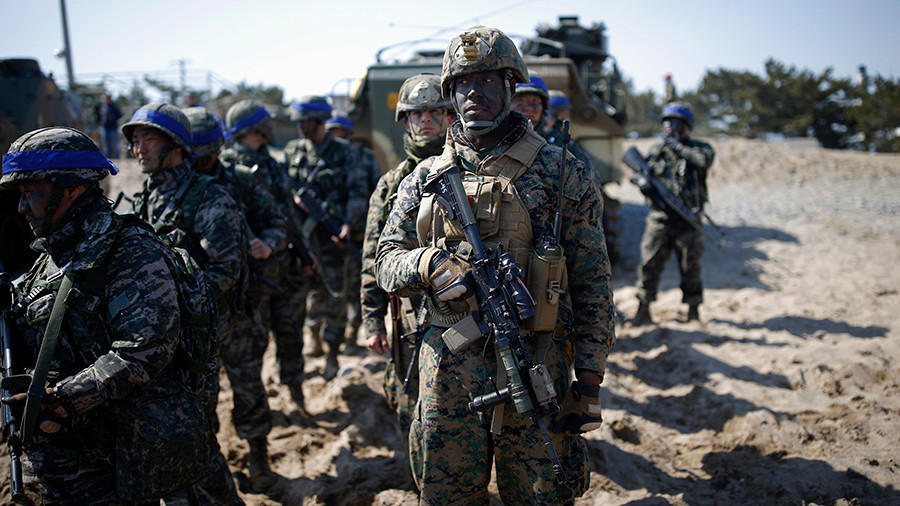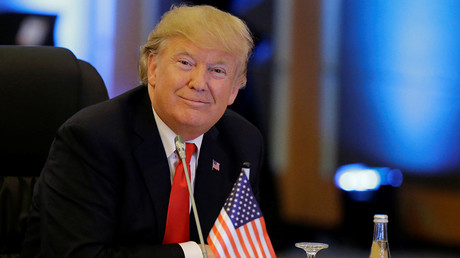N. Korea needs written guarantees that US will end drills to start talks – Russian senator

Pyongyang needs written guarantees of security and an end to military drills on the Korean Peninsula from Washington for negotiations between the sides to begin, a senior Russian senator, Vladimir Dzhabarov, has said.
"In order for talks between the US and North Korea to start, certain special conditions must be met,” Dzhabarov, deputy head of the upper house Committee for International Relations, told RIA Novosti. The most important one is that “Washington [gives] up staging military drills near the Korean Peninsula. And Pyongyang needs written guarantees of that,” he added.
According to Dzhabarov, the Americans have already violated their promise to curb the exercises in the autumn. It was the US move to hold new exercises that forced North Korea to resume ballistic missile tests, which were earlier put on hold, he said.
Also on Friday, US Secretary of State, Rex Tillerson, said that a “sustained cessation of North Korea’s threatening behavior” would be required for the US to agree to sit down at the negotiations table. "Apart from that step, there are no preconditions for talks, nor will we accept preconditions from North Korea or others," Tillerson said during a UN Security Council meeting dedicated to the Korean issue.
Also on Friday, US Secretary of State, Rex Tillerson, said that a “sustained cessation of North Korea’s threatening behavior” would be required for the US to agree to sit down at the negotiations table. "Apart from that step, there are no preconditions for talks, nor will we accept preconditions from North Korea or others," Tillerson said during a UN Security Council meeting dedicated to the Korean issue.
The secretary of State also urged Moscow and Beijing to increase pressure on Pyongyang and go “beyond full implementation of the UN Security Council resolutions,” sanctioning the country over its nuclear program and ballistic missile tests. He questioned “Russia's dedication as a partner for peace,” blaming it for continuing to allow North Korean workers to toil in "slave-like conditions" for wages used to fund nuclear arms.
Tillerson also doubted China's commitment to "solving an issue that has serious implications for the security of its own citizens" due to the crude oil still being supplied to the North Koreans by the Chinese.
Earlier, Russian Deputy Foreign Minister Igor Morgulov said that the pressure on North Korea has already reached the “red line,” with the country being at risk of “economic strangulation.” Morgulov told Interfax: “Russia will not be part of this,”adding that the sanctions were “counterproductive” and were hurting ordinary people.
Russia and China have been proposing the so-called “double freeze” solution to the Korean crisis, which envisages a halt on the joint US drills with South Korea in exchange for the North stopping its nuclear and missile tests, which would create the conditions for negotiations.
After his phone call with President Vladimir Putin earlier Friday, US President Donald Trump said that he would “love” to have help from Russia on North Korea. Kremlin press secretary Dmitry Peskov said that the Russian and US leaders agreed to share information and initiatives on the issue during the conversation.
Tensions have been on the rise on the Korean Peninsula in recent months as Pyongyang keeps pursuing its nuclear program and missile testing, despite international sanctions and condemnation, while the US and its allies intensify drills near North Korea’s borders. US President Donald Trump has repeatedly warned of a military scenario for North Korea, and recently included the country on the list of state sponsors of terrorism, paving the way for more sanctions. However, recently both sides have shown some interest in resolving the crisis via diplomatic means.
It’s not the North Koreans, but the Americans, who should be put under pressure to resolve the Korean crisis, Eric Sirotkin, human rights attorney and co-founder of Lawyers for Peace and Demilitarization In Korea, told RT. “It becomes necessary for international powers to not merely put pressure on the DPRK (North Korea), but to put pressure on the US for direct talks, formalizing relations and negotiating a lasting peace. These are required obligations under international law and under treaties such as the UN Charter that the US has ratified,” Sirotkin said. Apart from the “double freeze” proposal by Russia and China, “it is time the UN and other bodies call for unconditional talks,” he added.
The US has no other option but to accept the Russian-Chinese “double freeze” solution, as it’s obvious that military involvement in North Korea would be fruitless, Evgeny Kim, from the Centre for Korean Studies at the Institute of Far Eastern Studies of the Russian Academy of Sciences (IFES RAS), told RT. “It’s clear that nobody wants war. For South Korea, it’s the issue of life and death, and it’s obviously not going to fight. Japan doesn’t want war; China even more so. Russia also doesn’t allow the thought of this too. In the US, many high-ranked responsible generals don’t want to get involved in the war, which can’t be won, without an approval from the Congress,” he said. With even NATO allies such as Germany, France and the UK rejecting the military option, Washington has “nothing to do. They should agree to what we propose: ‘Put your drills – which, in principle, are a provocation by the US against the North – on hold for the talks to start,”Kim said. “If there will be an official proposal, I think the North will not reject talks. Besides, they always insist on direct negotiations,” he added.


0 Comments:
Post a Comment
Subscribe to Post Comments [Atom]
<< Home